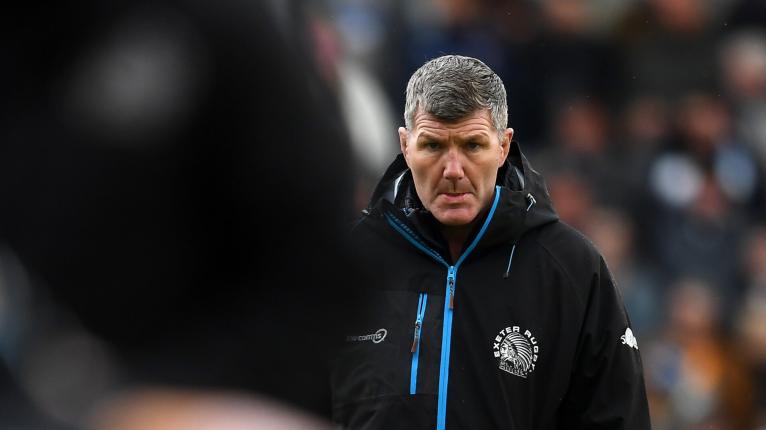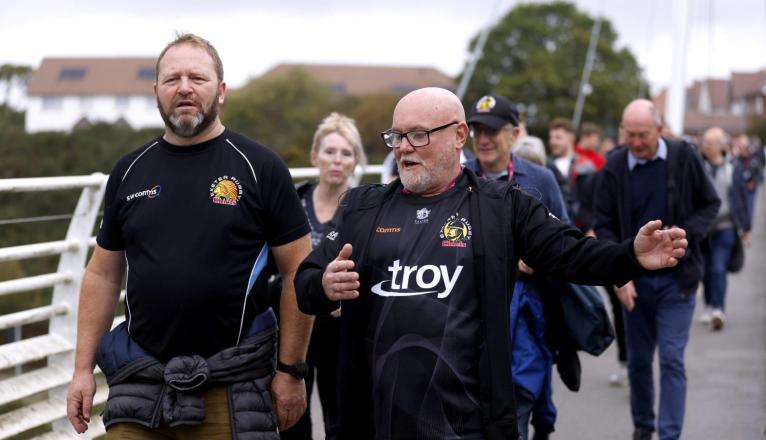Exeter's asset sale should concern every English rugby fan

English rugby has been through a tortuous few months after the administrations and suspensions of Worcester Warriors and Wasps Rugby. However last Friday evening, eyebrows were raised again, with the statement published by Exeter Chiefs, stating that they will sell a ‘non-rugby asset’ primarily due to struggles in generating the income to repay Covid-19 Government loans.
Given Chiefs were the only club to post a profit prior to the pandemic, what has happened and what does that statement mean for the beleaguered Premiership?
The Exeter Financials – what does it Show?
Well firstly, it is important to look specifically at Exeter Chiefs, and peruse their last accounts posted on Companies House. These were posted in December 2021 covering the 12-month period up to 30th June 2021 and relate to Exeter Group PLC, which covers both the playing side of the rugby club, as well as off-field affairs, including the hotel site.
Turnover in that period was pandemic affected and stood at £9.6m. To get a real feel for what their actual revenue stream should be, a peek at their accounts in 2019 is required and reveal a robust £21m in the coffers. That 2021 turnover was combined with a loss for the group of just under £4m.
The balance sheet for the group, at first glance looks healthy. The Group PLC have a positive Total Net Assets figure of £25m, very strong levels of cash at bank with £7m, with high levels of fixed assets to their name, totalling £62m. As a result, the accounts were signed off by the auditors on a going concern basis. Therefore, in theory, there should be no concerns over the club.
Borrowings
However further inspection in the accounts starts revealing what could be the cause of furrowed brows at the South-Devon club. The PLC has accumulated a total of £28m in long-term borrowings, both bank-led and otherwise. It is here that the challenges start to reveal themselves.
For a business that has turned over a figure of £9m, having long-term borrowings of that size can be dangerous and leave them exposed. Now in mitigation, the revenue for the latest year-end, up to June 2022, will be much higher given crowds were allowed back into fixtures. A figure of closer to 2019’s £21m is more likely to be posted. However, even with this in mind, carrying that level of long-term debt is a risky strategy to have for a club, and more importantly business, like Chiefs. This has been reinforced by recent events.

What are the loans?
Of that £28m, the largest due is £10.4m relating to a bond, raised by the company, and paid into by investors, including Chairman Tony Rowe. This is secured with an ‘unsecured debenture’. This is rare. Most funding facilities are secured against specified assets of the business, providing security to the lender in case of business failure or defaulting of the repayments. Such unsecured lending is usually for a business that has a very strong credit rating and history, reflecting the previous strength of the Exeter business. However, such lending comes at a higher risk, and that is reflected in the cost of borrowing which is notified at a fixed 5.5 per cent in the accounts. This would have been considered an expensive form of lending when this was first taken out, however in the current climate it now looks reasonable.
The next largest borrowing relates to the £6.81m loan provided by Sport England, secured by a fixed and floating charge against all properties and undertakings of the company. This sounds intrusive, however in reality, the Government are unlikely to pursue it. It also comes with fixed interest rate of 2 per cent, which would have been seen as good value in 2020. In the current climate it is by far the cheapest form of borrowing that the club have. Neither the bond nor the Sport England loan will be causing the club too much of a headache.
What will concern Exeter the most are the bank borrowings. The PLC has a Government CBILS loan from Barclays Bank for £5m that is due by 2030. This was taken out with an interest rate of 2.3 per cent above LIBOR and is secured against the receivables of the business – what is owed to Chiefs. Secondly, they have a term loan from NatWest for £6.6m. This is secured against the assets of Sandy Park Hotel Ltd – a subsidiary business of the PLC – as well as by a Personal Guarantee of £750k from Tony Rowe. This has an interest rate of 3.5 per cent over LIBOR.

These two loans are the issue for Exeter because of that cost of borrowing. In 2020 LIBOR was under 1 per cent throughout the year, getting lower as the year went on, with three-month LIBOR being below 0.1 per cent by the close of 2020. As a result, Exeter’s borrowing decisions at the time of taking them out looked smart, and a good decision to make. However, interest rates have now spiralled in the last two years, three-month LIBOR is now 4.46 per cent, taking Exeter’s CBILS and Term Loan to 6.76 per cent and 7.96 per cent respectively. That now must be having an impact on business performance.
So what are the implications?
The issue mainly appears to be around cash flow. With the vast increases in borrowing costs, Exeter are suddenly more exposed due to how much borrowing they hold. Add in those HMRC obligations – previous and current, an increase in trade creditors as well as a monthly wage bill of circa £1m, and you can see where the coffers are being stretched. Judging by their statement last week, they are clearly not generating the income required to generate the liquid cash needed to repay everyone. Attendances are also down compared to last season and home fixtures cancelled due to Wasps and Worcester’s well-documented issues, which will be potentially causing challenges to the business.
So last Friday’s announcement means the club are either selling an asset to be proactive to try and get ahead of the issue. Or it is more serious, and they are being reactive because the problem is becoming too large to handle. For now, the club remain tight-lipped. Either way, it appears that cash flow is a headache, caused by a large amount of long-term borrowing that’s become more expensive with the recent interest rates rise. The good news for Chiefs is that they can tackle the issue and have an option to find a way out, whereas many other businesses or clubs do not have such luxury.
The Challenges facing English Rugby
When you think of sports clubs, you think of massive institutions like in Premier League football, which is a billion-dollar industry. Rugby, specifically English rugby, is very much the opposite. Clubs like Exeter, are the very definition of UK SME’s (small and medium-sized enterprises), meaning they face the same challenges as local family-owned businesses in the area. The cost of borrowing increases affect everyone. The difference is that Chiefs are in the public eye and will come under more scrutiny as a result.
The challenges facing Exeter are typical of those facing Premiership clubs in general. Going into debt is not a bad thing for a business, depending on what type of debt it is. There is bad debt – such as HMRC arrears, or there is good debt, where you borrow to invest or grow your business.
Ever since the sad demise of Worcester and Wasps, there has been a lot of calls for rugby clubs to grow their revenue streams to prevent further administrations. However, as Exeter’s challenges show, this is easier said than done. Exeter took on debt to invest in their business, as well as grow and diversify their income stream. Yet almost straight away, they are having to contemplate side-lining this project given the costs involved. There is no point increasing your revenue if it is all being spent on increased borrowing costs.
It therefore poses a conundrum to clubs. Borrowing to invest is tricky, as shown at Exeter. Lifting ticket prices alienates your fanbase. Sponsors are increasingly hard to find. Hospitality income is struggling to recover post-Covid. Where does this new income come from? That’s what club CEO’s will currently racking their brains about.
What does that mean for the rest of the Premiership?
The crisis in English rugby is not unique to those clubs already gone – as the issues at Exeter attests. English rugby is also not alone in facing challenges. The UK economy is dealing with rampant inflation, spiralling interest rates with insolvencies beginning to tick up. Forecasts indicate that the UK economy is set for a longer-lasting recession than any since the Second World War. As a result, the headwinds are heading only one way only.
The worry for English rugby is that the country is about to head into a recession, yet the sport is there already. Two clubs have already gone from the top-flight, with more rumoured to be on the breadline, yet the economy is far from reaching its nadir. It is like knowing there is a hurricane coming imminently, yet your house has caved in at the first light rain shower. Put simply, your chances of survival are not good. The added danger is that of contagion. If more domino blocks fall, even your strongest businesses get dragged into a mess. Having a good business model to recover is of no use if you have no opponents to play against.
Last week’s news out of Exeter should concern every English rugby fan – if they, as a well-run business, are beginning to creak, no one is safe. English rugby is set for an uncertain future and the problems are not going away any time soon.
Exeter statement on asset sale: “As a result of the Rugby Football Union and Premiership Rugby Limited’s decision to continue playing behind closed doors during the Covid-19 pandemic, Exeter Rugby Club were forced to borrow substantial government-backed loans to pay our players and staff.
“The funding from the government was not in the form of grants, but loans which carry interest. These are due to be repaid and the income from our normal trading is not sufficient to pay them and all other expenses.
“Accordingly, the rugby club board decided to sell one of our non-rugby assets for which members’ approval is needed and which is being sought at an extraordinary general meeting at Sandy Park on Wednesday, November 30.
“This should be more than sufficient to see the club pay the loans and be financially secure for the future. No further comment will be made by the rugby club.”

























































































At this point, there seems to be no doubt that the "less is more," model must be followed. Ten clubs, fewer matches. I'm almost at the point of being okay with ring fencing it. That opinion would've been unthinkable to me 2 months ago but for the first time, it feels like the whole domestic game could collapse. I'd rather a ring fenced league than no league. You need the players spread among fewer teams, with higher stakes matches that don't overlap with the international game. The game is such high quality now, imagine the case when you have more concentrated talent and every match means a bit more.
One thing I've noticed, the English game is in a bad spot, the Welsh domestic sides are nearly bankrupt. I haven't heard a peep about Edinburgh & Glasgow Warriors, or Ulster. All technically exist under the same poor UK economy.
I know in England & Wales there are issues that have existed prior to the economic downturn. But since the downturn is playing a role, why hasn't it had the same effect on the Scottish & Northern Irish clubs as in England & Wales? Is it just that the foundations in England & Wales were already so poor?